By LARRY BLUMENFELD
Los Angeles
In 1977, violinist Leroy Jenkins asked Wadada Leo Smith to compose a piece for his group. Already a daring trumpeter who used silence as much as sound to communicate ideas, Mr. Smith had by then also laid the groundwork for the personalized language that defines his compositions today—informed but not constrained by jazz, and distinguished most starkly by a flexible approach to rhythm. He named the piece he handed Mr. Jenkins "Medgar Evers," after the slain civil-rights activist. In 1998, a commission from Southwest Chamber Music, based in Pasadena, Calif., inspired Mr. Smith to compose a string quartet. Again, his title paid tribute to a significant figure in the civil-rights struggle: "Rosa Parks."
That string quartet was a riveting highlight on Friday during Mr. Smith's "Ten Freedom Summers," a 21-piece work that spanned three nights in premiere at the Roy and Edna Disney/CalArts Theater (Redcat) in Los Angeles. Halfway though Saturday's program, "Medgar Evers," now scored for chamber ensemble, signaled a mood shift, from tense to triumphant. "Ten Freedom Summers" is named for a 10-year stretch, from the landmark Brown v. Board of Education Supreme Court decision declaring school segregation unconstitutional to the "freedom summer" voter-registration drive and Civil Rights Act of 1964. It also traces Mr. Smith's life as a composer through 34 years—from "Medgar Evers" to his tribute to John F. Kennedy, written just last month—to form a personal reflection on the legacy of the civil-rights movement from a musician, born in Leland, Miss., in 1941, who came of age as that history took shape.
It can also be heard as a statement of artistic empowerment. Like his colleagues formatively affiliated with Chicago's Association for the Advancement of Creative Music, Mr. Smith blends improvisation and form in ways that elude genre categorization. At the Redcat, his Golden Quartet, one of several groups he regularly leads, was assembled stage right, the nine-member Southwest Chamber Music ensemble stage left. In between might have stood the forbidding divide that damns most supposed "jazz-meets-classical" endeavors. Here, several pieces were played by one ensemble while the other sat silent, which could have invited uneasy tension or a dissociation of parts.
No such thing occurred, owing largely to Mr. Smith's Golden Quartet, which adheres to jazz convention only through instrumentation. Drummer Susie Ibarra, bassist John Lindberg and pianist Anthony Davis played mere fragments of anything resembling jazz's swinging pulse; rather, they embodied Mr. Smith's concept of "rhythm units," which can at first sound undefined but eventually—especially through such an expansive program—prove elastic enough to convey finely calibrated tensions and releases. The Southwest ensemble's familiarity with Mr. Smith's approach—it returned to his 1998 piece, "Rosa Parks," for a 2009 recording—and music director Jeff von der Schmidt's longstanding embrace of adventurous repertoire afforded both common purpose and shared literacy.
Mr. Smith's Golden Quartet is a wondrous vehicle for his intent: Its performance of "America, Parts 1 & 2" within Sunday night's program would have anchored a satisfying club engagement. The sections combining ensembles—as a double quartet, or all 13 musicians—brought novel pleasures, such as the way the strings responded to Ms. Ibarra's staggered beats. Saturday night ended with a breathtaking moment, when an extended passage from Ms. Ibarra and percussionist Lynn Vartan, playing timpani, abruptly stopped and the sound dissolved into a soft wash of strings. Occasionally, violin glissandi referenced both contemporary classical technique and the bent tones of the blues. Mr. Smith suggested jazz in subtler ways; his music, built on cells of melody and harmony that combine in ever-shifting fashion, created the feel of improvisation through notated parts while also sneaking the chamber musicians out of any strict sense of meter. There were impressive solo passages, especially by Messrs. Davis and Lindberg, and violinist Shalini Vijayan. But mostly this was communal music, with interlocking parts, contrasting timbres and harmonic convergences that lent weight and meaning.
Mr. Smith will celebrate his 70th birthday in December with a two-night stand featuring six different ensembles at Roulette in Brooklyn, N.Y. "Ten Freedom Summers" was as striking a display of his expansive vision and his vitality. He still plays trumpet as he always has: with little vibrato and a tone that can be either boldly declarative or soft to the point of breaking. His phrases range from skittering leaps of intervals to single notes repeated as long tones. In a work dedicated to nonviolent struggle, his most emphatic moments were often his softest. Which is not to say he lacked fire. During Sunday night's performance, when a succession of slow and broken phrases threatened to deflate the mood, his playing grew fierce. As if summoned, his Golden Quartet quickly matched that intensity.
"Ten Freedom Summers" had a visual component too. Brief avant-gardish black-and-white films preceded each concert to bracing effect. Documentary photographs—Malcolm X, a protest march—were occasionally projected on a screen above the musicians; these seemed overly literal. During other stretches, abstract shapes morphing in real time to the music posed an opposite problem, an absence of meaning. After Sunday's final piece, a recorded snippet of Martin Luther King Jr. was played, from his 1968 "I've Been to the Mountaintop" speech. Mr. Smith needn't—shouldn't—have included this. However inspirational is King's voice, however elemental his message, Mr. Smith had made his own statement through instrumental music. And it sounded complete.
Mr. Blumenfeld writes about jazz for the Journal.













![[BIOFUEL]](http://si.wsj.net/public/resources/images/MK-BQ287_BIOFUE_C_20111107185245.jpg)
![[clinton1107]](http://si.wsj.net/public/resources/images/OB-QL565_clinto_C_20111107192247.jpg)
![[pension]](http://si.wsj.net/public/resources/images/MI-BM100_pensio_C_20111107175842.jpg)
![[DESIGN]](http://si.wsj.net/public/resources/images/PJ-BD632_DESIGN_C_20111107170821.jpg)
![[SP_COUNTPJ1]](http://si.wsj.net/public/resources/images/PJ-BD614_SP_COU_C_20111107172816.jpg)

Most Recommended
“I'm in primary care, and if I we...;”
“"Cosmetics aside, there is...;”
“This is perplexing to us...;”
“The following statement must be...;”
“Mr Cain's alleged indiscretions ...;”